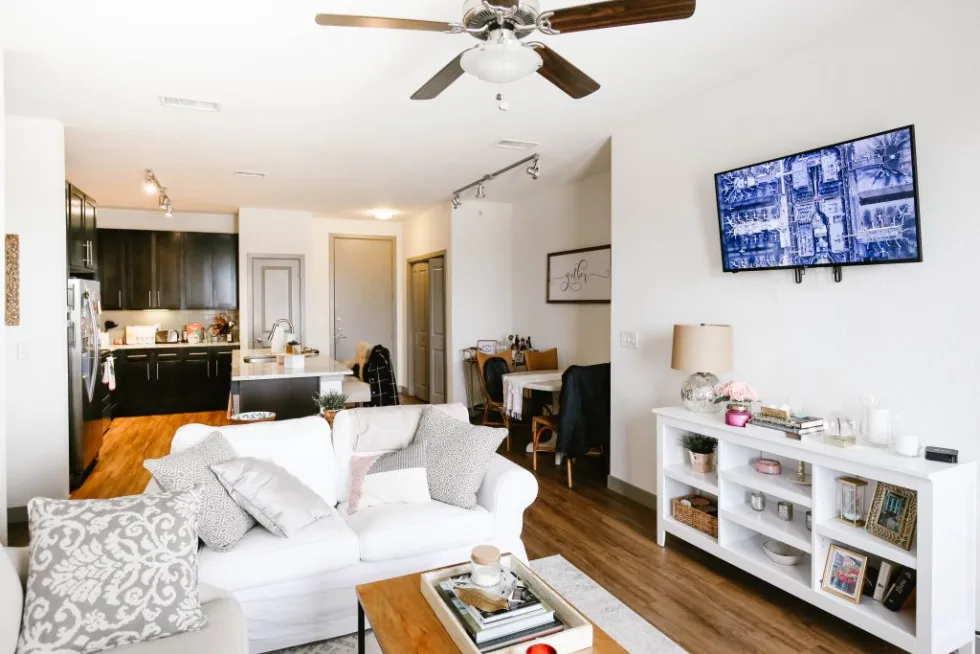A furnished apartment is a great option if you’re relocating for a short time and do not intend to move your heavy furniture. This way, you do not have to worry about heavy lifting and all the stress caused by moving.
But just because the apartment is fully furnished doesn’t mean you’ll just find everything you need inside.
Not all rentals are designed equally. Some might require you to bring some things like shrubs for the entrance, while others come with everything needed to live comfortably.
In this article, we take a look at eight things to look out for when touring a furnished apartment!
The Lease
How long you plan to stay will determine the length of the lease.
Most furnished apartments have short-term leases, making them suitable for corporate housing, as many renters spend only a few months in such places. They are also great for students who spend a semester there and can’t afford to buy furniture of their own.
Apart from how long the lease is, it’s a good idea to inspect the information on the agreement and make sure you understand what’s expected of tenants.
For example, know what the policy says about subletting if you plan on doing so during months you’ll be away.
In addition, confirm other aspects such as renovations, pest control, when to expect your deposit after moving out, and renewal of the lease.
Amenities
Most rentals come with lavish amenities like immersion water heaters, elegant countertops or air air conditioners, depending on the target market and location.
In many cases, fully equipped and furnished apartments for rent come with heat and air conditioning, laundry services, balcony/patio, fitness centers, printing areas, communal outdoor spaces, package locker systems, and more.
Power Outlets
Many things you need every day require a power outlet to run, including mobile phones, kitchen appliances, TVs, etc.
When you visit the apartments for rent in Apopka, ensure you bring something small to plug in and test each outlet you spot to ensure they work. This can be an Electrical Receptacle Wall Plug AC Outlet Ground Tester that goes for less than $10. Don’t forget to test the lights too to see all are working as they’re supposed to.
Appliances
You might also need to check whether the appliances in the apartment are working. This includes stoves, ovens, dishwashers, microwaves and fridges.
If some are non-functional, talk with the landlord about upkeep and repairs going forward.
Water Pressure and Temperature
There’s nothing worse than water that flows too slow or too hard. You don’t have to get inside the shower to test the pressure, you can just put your hand under the tap to ensure it’s suitable.
If there are any issues with it, consult the landlord to know if something can be done.
Cell Phone Reception
Cell phones are now a crucial part of our lives, given that we rely on them for work, talking with friends and families, and keeping track of our everyday tasks.
Check the new apartment to ensure the reception is consistent in different areas. It’s also important to ask whether the landlord offers incentives like Wi-Fi.
Pet Policy
If you have a pet, it’s easy to overlook the building’s pet policy in your eagerness to sign the contract.
Even if you don’t own one yet, you might still want to know should plans change in the future. Some places will allow pets, while others include a pet fee depending on the breed.
Others have a strict no-pets policy, so it’s essential to know from the start whether or not you are getting into a pet-friendly apartment.
Parking
This mainly applies if you have a car. It’s important to find out if the apartment has an available parking space. While you’re at it, ask whether they charge extra for the parking space — because some apartments factor this into your overall budget. Also, inquire about the competition for spots in the parking lot if you live in a busy apartment complex.
Conclusion
So, there you have it – a few key things to check for when going for an apartment tour.
After talking to your landlord or agents, you can still do a few more things to maximize the apartment tour.
For example, get to know what your would-be neighbors like and don’t like about the apartment.
If you can, stick about and see how the neighborhood is at night, looking for things such as security concerns and noise levels. Finally, be sure to read any fine print in your agreement before signing it.
Did we leave out something important that needs addressing? Let us know your feedback in the comments section.

